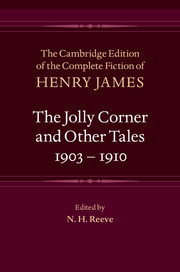Book contents
- Frontmatter
- Contents
- Acknowledgements
- List of Abbreviations
- General Editors’ Preface
- General Chronology of James’s Life and Writings
- Introduction
- Textual Introduction
- Chronology of Composition and Production
- Bibliography
- The Jolly Corner and Other Tales 1903–1910
- Glossary of Foreign Words and Phrases
- Notes
- Textual Variants
- Emendations
- Appendices
VI
Published online by Cambridge University Press: 11 April 2021
- Frontmatter
- Contents
- Acknowledgements
- List of Abbreviations
- General Editors’ Preface
- General Chronology of James’s Life and Writings
- Introduction
- Textual Introduction
- Chronology of Composition and Production
- Bibliography
- The Jolly Corner and Other Tales 1903–1910
- Glossary of Foreign Words and Phrases
- Notes
- Textual Variants
- Emendations
- Appendices
Summary
It was demonic of Bight, who immediately answered that he would tell him with pleasure who everyone was, and she felt this the more when her friend, making light of the rest of the entertainment they had quitted, advised their sacrificing it and proceeding to the other scene. He was really too eager for his victim—she wondered what he wanted to do with him. He could only play him at the most a practical joke—invent appetising identities, once they were at table, for the dull consumers around. No one, at the place they most frequented, had an identity in the least appetising, no one was anyone or anything. It was apparently of the essence of existence on such terms— the terms, at any rate, to which she was reduced—that people comprised in it couldn't even minister to each other's curiosity, let alone to envy or awe. She would have wished therefore, for their pursuer, to intervene a little, to warn him against beguilement; but they had moved together along the Strand and then out of it, up a near cross street, without her opening her mouth. Bight, as she felt, was acting to prevent this; his easy talk redoubled, and he led his lamb to the shambles. The talk had jumped to poor Beadel— her friend had startled her by causing it, almost with violence, at a given moment, to take that direction, and he thus quite sufficiently stayed her speech. The people she lived with mightn't make you curious, but there was of course always a sharp exception for him. She kept still, in fine, with the wonder of what he wanted; though indeed she might, in the presence of their guest's response, have felt he was already getting it. He was getting, that is—and she was, into the bargain—the fullest illustration of the ravage of a passion; so sublimelyMarshal rose to the proposition, infernally thrown off, that, in whatever queer box or tight place Beadel might have found himself, it was something, after all, to have so powerfully interested the public. The insidious artless way in which Bight made his point!—“I don't know that I’ve ever known the public (and I watch it, as in my trade we have to, day and night) so consummately interested.”
- Type
- Chapter
- Information
- The Jolly Corner and Other Tales, 1903–1910 , pp. 113 - 121Publisher: Cambridge University PressPrint publication year: 2017

